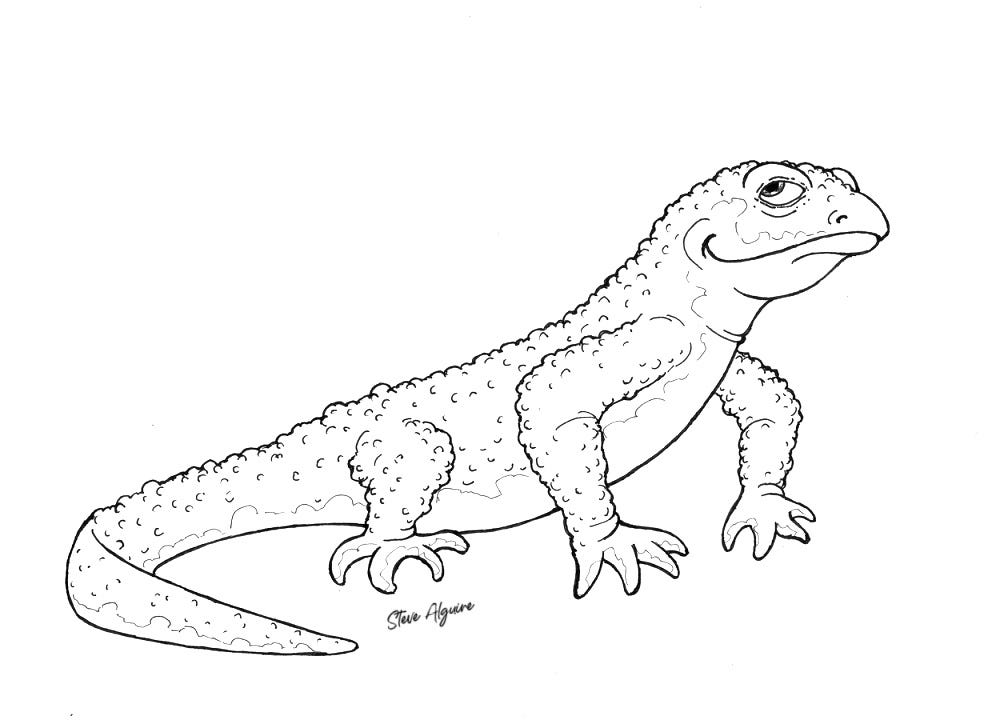March of the Newt
Rough-skinned Newts just keep on truckin'
Hello all and welcome to a Monday issue of Mouse and Minnow. Today we're celebrating the Rough-skinned Newt (Taricha granulosa), an amphibian of North America's Pacific Northwest.
The Rough-skinned Newt is best known for being highly toxic, and for being locked in an "evolutionary arms race" with common garter snakes who have developed a resistance to their toxin (which leads to more toxic newts evolving, which leads to more resistant snakes, which leads to more toxic newts, and so on). But now Rough-skinned Newts also have to contend with habitat destruction and degraded water quality. Because the newts are both aquatic and terrestrial, roads built between woodlands and water are particularly deadly, but there are some humans out there who are trying to help put things right...
March On, Little Rough-Skinned Newt
You march on, little rough-skinned newt;
Adapt or die, it's make or break.
Have you found the surest route?
Secreting toxin like a brute,
Trying to outpace the snake.
You march on, little rough-skinned newt,
Though evolution's resolute
What you dish out they'll learn to take.
Have you found the surest route?
Now humans come, degrade, pollute
And slice the world with roads we make.
You march on, little rough-skinned newt
Though you're no match for wheel or boot,
But you are swept in instinct's wake;
Have you found the surest route?
A tunnel then, for your commute,
This duty we will undertake.
You march on, little rough-skinned newt
Have you found the surest route?
~ Marilyn Anne Campbell
(The above is a villanelle, a type of highly-structured poem with repeating phrases. One of the most well-known villanelles is "Do Not Go Gentle Into That Good Night" by Dylan Thomas.)
Deadly but Adorable
The Rough-skinned Newt is that rare combination of being both docile and deadly. They are also pretty darned cute. When threatened, the newts roll over or rise up at both ends to show off their bright orange-yellow undersides, a warning flag in the natural world that deters most predators. Of course they are also predators themselves, feeding on small insects and other invertebrates. Somewhat slow and plodding on land, these charming, semi-aquatic salamanders* are much faster in the water, letting their limbs hang loose while they use their flat tails for propulsion.
*Newts are a type of salamander; the term newt is generally used for salamanders from the subfamily Pleurodelinae. One way to think of it is "All newts are salamanders but not all salamanders are newts" (and if you're a fan of Big Bang Theory, feel free to imagine Zack as the one saying it).
Wildlife Crossings
The tunnels mentioned at the end of the poem are real solutions that some communities are implementing to help reptiles and amphibians cross roads safely by installing wildlife underpasses. Angled fencing is often used to guide salamanders, frogs, toads, snakes, lizards, and even turtles to the tunnel entrances. In other places, wildlife bridges are used to help larger animals cross over highways. In good news for animals, the infrastructure bill just passed in the United States included $350 million earmarked for wildlife crossing projects. Re-connecting fragmented habitat is just one of the many steps needed to help stop massive biodiversity loss.
The video Protecting Life on Land with the Association of Wetland Stewards for Clayoquot & Barkley Sounds from the West Coast NEST YouTube channel has great details on a wildlife culvert created in British Columbia to help amphibians. The six-and-a-half minute video has information on a variety of projects; if you'd just like to see the tunnel segment start at 3:35 (or at 4:00 if you'd rather not see frog and salamander roadkill)
Newt Links
The Canadian Herpetological Society profile nicely summarizes the Rough-skinned Newt basics…
while this page from California Herps has a ton of photos !
Read about "The Very Long War Between Snakes and Newts" in this 2016 article from Ed Yong, acclaimed science writer for The Atlantic.
You can also read about some much more recent research out of Michigan State University around the newt and the bacteria which generates the toxin with "The BEACON, the bacteria, and the rough-skinned newt"
Or just enjoy some adorable rough-skinned newt footage with this video from the Oregon Zoo "A Cute Newt with a Toxic Superpower" (lookit how they swim!)
What Say You on Newts & Chutes?
Have you ever seen a newt or other salamander in the wild? What do you think of “toad tunnels” and other wildlife crossings?
Also, if you liked this issue be sure to click the heart at the top or bottom of this post to let us know, and consider sharing the post with others you think might enjoy it. We also have an anonymous Google Form Reader Survey where you can let us know what you’d like to see more or less of in the newsletter.
About & Subscribe
Mouse and Minnow is co-created by partners Steve Alguire (illustration) and Marilyn Anne Campbell (writing). Learn more about the newsletter or use the subscribe button below to receive original art and writing about the wonderful creatures of this world right in your inbox.
(Please note: This newsletter is hosted by Substack.com. Before subscribing, you should be sure that you consent to Substack’s terms, including their terms of use, privacy policy, and the information collection notice found under their CCPA Policy.)
© All images and text are copyright the respective author. You are encouraged to share this newsletter with others by forwarding it or sharing the link to the online archive, but all other uses, including reposting individual or complete content, are not permitted without specific consent.

